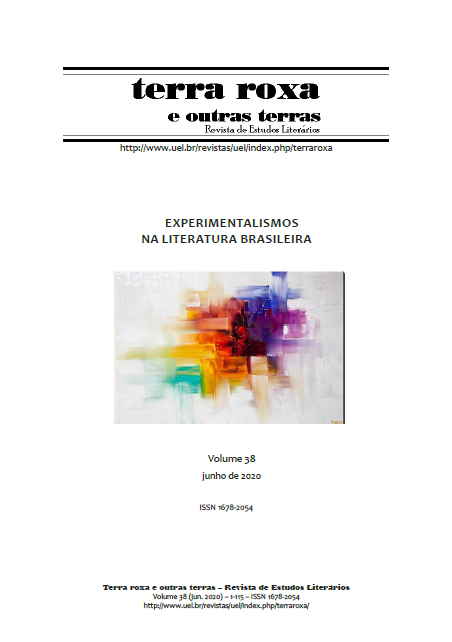The machadian invention and sternian experimentalism as a prologue to the 20th centry: polyphonic poetics and self-conscious multiplicity
DOI:
https://doi.org/10.5433/1678-2054.2020v38p78Keywords:
Memórias póstumas de Brás Cubas, Prologues, Self-conscious genre.Abstract
The poetics of the novel goes through great transformations with authors such as Xavier de Maistre and Laurence Sterne (in the 18th century) and Machado de Assis (in the 19th century). In this proposal, we highlight the works The life and opinions of Tristram Shandy, Gentleman (Sterne 1759) and Memórias póstumas de Brás Cubas (Assis 1880), whose publication in a short story completes 140 year in 2020. Understanding Memórias Póstumas as the first experimental Brazilian novel, we observe the marks of Sterne and Maistre language evoked by the dead author Brás Cubas since the Prologue of his memories, not by chance, posthumous. To address the ways of making self-conscious genre, we resumed unlimited styles with Rabelais and Cervantes. Wandering through Romanesque prologues, we look into “Ao leitor” by Machado. Supported by 20th century literary thinkers, such as Carpeaux, Borges, Bakhtin, and Calvino, we established a relationship between the concepts of polyphony and multiplicity in an understanding of literary without stable and hierarchical models. This way, we reveal the condition of a tanatographic poetics by the created author Brás Cubas, from which emanate desires and move self-conscious novelistic forms in constant biographical decomposition.Downloads
References
BAKHTIN, Mikhail. A cultura popular na Idade Média e no Renascimento: o contexto de François Rabelais. São Paulo: Annablume/Hucitec, 2002.
BAKHTIN, Mikhail. Estética da criação verbal. Trad. Paulo Bezerra. São Paulo: Martins Fontes, 2003.
BAKHTIN, Mikhail. Problemas da poética de Dostoiévski. 5. ed. Trad. Paulo Bezerra. Rio de Janeiro: Forense Universitária, 2010.
BEZERRA, Paulo. Posfácio. Fiódor Dostoiévski. Bobók. Trad. Paulo Bezerra. São Paulo: Ed. 34, 2005, pp. 111-125.
BORGES, Jorge Luis. Prólogos. Rio de Janeiro: Rocco, 1985.
CALVINO, Italo. Multiplicidade. Calvino I. Seis propostas para o próximo milênio: lições americanas. 3. ed. Trad. Ivo Barroso. São Paulo: Companhia das Letras, 2010, pp. 115-138.
CALVINO, Italo. “Prezentazione”. Le città invisibili. Verona: Mondadori, 1993, pp. 3-11.
CALVINO, Italo. Se um viajante numa noite de inverno. Trad. Nilson Moulin. São Paulo: Companhia das Letras, 1990.
CANDIDO, Antonio. Formação da literatura brasileira: momentos decisivos, 1750-1880. Rio de Janeiro: Ouro sobre Azul, 2012.
CARPEAUX, Otto M. Reflexo e realidade. Rio de Janeiro: Fontana, 1976.
FRYE, Northrop. Anatomia da Crítica. São Paulo: Cultrix, 1957.
HOBSBAWM, Eric. Era dos extremos: o breve século XX: 1914-1991. Trad. Marcos Santarrita. São Paulo: Companhia das letras, 2008.
JOYCE, James. Ulysses. Trad. C. W. Galindo. São Paulo: Penguim Classics/Companhia das Letras, 2012.
MEDEIROS, A. C. M. Poética socrática, tanatografia e a invenção do desassossego. 2017. Tese (Doutorado em Literatura). Universidade de Brasília, Brasília. Disponível em:https://repositorio.unb.br/handle/10482/842.
SCHNEIDER, Michel. Mortes imaginárias. Trad. Fernando Santos. São Paulo: A Girafa Editora, 2005.
SENNA, Marta de. O Olhar Oblíquo do Bruxo: ensaios em torno de Machado de Assis. Rio de Janeiro: Nova Fronteira, 1998.
SILVA JR, Augusto R. da. Morte e decomposição biográfica em Memórias Póstumas de Brás Cubas. 2008. Tese (Doutorado em Literatura Comparada) – Universidade Federal Fluminense, Niterói. Disponível em:http://www.livrosgratis.com.br/arquivos_livros/cp074719.pdf.
STERNE, Laurence. Tristram Shandy. Chicago: Encyclopedia Britannica, 1952.
STERNE, Laurence. A vida e as opiniões do cavalheiro Tristram Shandy. Trad. José Paulo Paes. 2. ed. São Paulo: Cia. das Letras, 1998.
Downloads
Published
How to Cite
Issue
Section
License
Authors who publish in this journal agree to the following terms:
a) The authors retain the copyright and grant the journal the right of first publication, the work being simultaneously licensed under the Creative Commons Attribution-NonCommercial 4.0 International License, allowing the sharing of the work with acknowledgment of the authorship of the work and initial publication in this journal.
b) Authors are authorized to assume additional contracts separately, for non-exclusive distribution of the version of the work published in this journal (eg, publish in an institutional repository or as a book chapter), with acknowledgment of authorship and initial publication in this journal.
c) Authors are allowed and encouraged to publish and distribute their work online (e.g. in institutional repositories or on their personal page) after the editorial process, as this can generate productive changes as well as increase impact and citation of the published work (See The Effect of Open Access).
d) The authors of the approved works authorize the journal to, after publication, transfer their content for reproduction in content indexers, virtual libraries and the like.
e) The authors assume that the texts submitted for publication are of their original creation, taking full responsibility for their content in case of any objection by third parties.



















